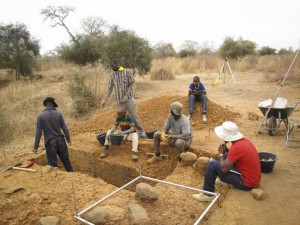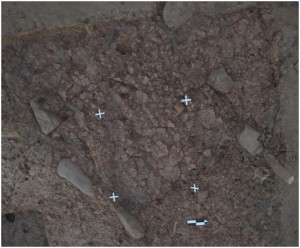Alinguel is a vast occupation complex that extends along the western bank of the Falémé northeast of the modern eponymous village.
Survey of the site complex allowed identification of three zones potentially rich in artifacts; test excavations were done in each zone. One of these was subsequently excavated in two sectors. At the end of this work, many samples were collected, prepared and analyzed, including pottery, beads, charcoal, bone and metal objects.
The first excavations led to the discovery of rectangular structures with evidence of fire, particularly charred seeds (currently being analyzed). These structures have been provisionally interpreted as the remains of a series of raised granaries. Circular stone structures with many cobbles, associated with pits containing bone, and a granite grindstone posed vertically were also found.
Radiocarbon dates on charcoal indicate that the site underwent several distinct periods of occupation from the 1st millennium BC. Maximum occupation took place between the 6th and 13th centuries AD and coincides with the rise of the kingdoms of Ghana and Mali and exploitation of the gold region of Bambouk.
Our work focuses on analysis of changes in this settlement and explanation of the impact of the development of West African pre-city state formations on social, economic and political life of rural societies of the Falémé.


